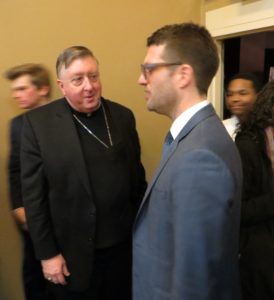January 13, 2017
Mercy Behavioral Health holds event to launch opioid campaign
REGIONAL
Story and photos by Julie Beaulieu

Former NBA player Chris Herren addresses audience at City Stage in downtown Springfield.
SPRINGFIELD – Mercy Behavioral Health Care kicked off its opioid campaign last night, Jan. 12, at Springfield’s City Stage. Tackling the opioid crisis head on is the campaign’s mission, which has been titled, “All You Need is Love.”
Speakers were Marylou Sudders, secretary of health and human services for the Commonwealth of Massachusetts; Dr. Robert Roose, chief medical officer and vice president of addiction and recovery services for Mercy Behavioral Health Care; and Chris Herren, former NBA player and recovered opioid addict.
Herren spoke candidly about his addiction to an audience of 400, including Springfield Bishop Mitchell T. Rozanski, Sisters of Providence Kathleen Popko and Mary Caritas, local and state politicians, family members of addicts, and addicts facing recovery.
“I started drinking my father’s beer at age 14,” said Herren, explaining how this led to a cocaine addiction during his college career, which landed him in rehab for the first time at age 21.
“One night, in 1999, a high school friend came by and offered me these new, little yellow pills called OxyContin. After $20 and one pill, I was hooked,” said Herren.
Herren, who was raised Catholic in the town of Fall River, Mass., told iObserve how returning to his faith aided in his recovery.
“My mom passed away at a very young age from cancer and growing up, as a kid, my mom made me be an altar boy. And, I never really understood the meaning. I struggled with Mass,” he said. “But, on June 4, 2008, I walked back to my room in my treatment center, dropped to my knees and started praying, and I’ve been sober ever since. My spirituality, my faith, my religion, plays a huge part in my recovery.”
Roose has found that faith and spirituality often are key components in recovery and maintaining sobriety.
“One of the fundamental principles of somebody receiving treatment and entering recovery is to find meaning, to find hope,” said Roose. “And many individuals who go down that path look to religion or spirituality to provide that source of meaning, or hope in their life.”
Sudders explained some key components of the new opioid law, which went into effect in 2016.

Springfield Bishop Mitchell Rozanski talks with Dr. Robert Roose at Mercy Behavioral Health Care’s opioid presentation at City Stage in Springfield.
“It includes, for the very first time, a limit in prescriptions of opioids. For a first-time prescription of opioids, it’s limited to seven days,” Sudders explained. “It also requires physicians to check what is called a prescription monitoring program, to see what a person’s history is of using opioids. It also requires that all individuals who are prescribers get an education and have the latest information available to them on the use, and potential misuse, of opioids. It’s one of the first bills like this in the country.”
A fundraising Caritas gala is being planned for March 11 as part of the All You Need is Love Campaign.
For more information on Mercy Behavioral Health Care’s plan to help the community, visit mercycares.com/pathway-to-care, or text LOVED to 71441 to download the app. Both also include information on help and rehab.
A video segment on the Jan. 12 event will be featured on an upcoming edition of “Real to Reel,” which airs on Saturday evenings at 7 on WWLP-22NEWS.


 Facebook
Facebook Youtube
Youtube
